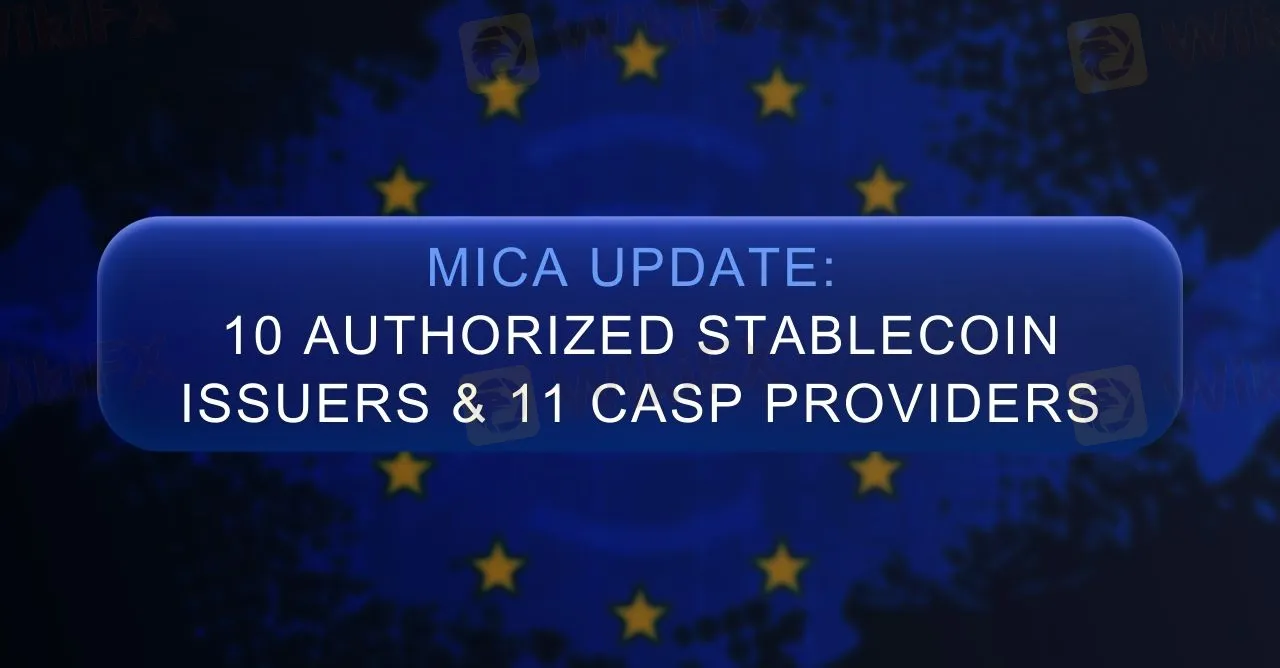EU MiCA Update: 10 Authorized Stablecoin Issuers & 11 CASP Providers
Abstract:Under MiCA, 10 firms have been authorized to issue e-money tokens (EMTs), commonly known as fiat-backed stablecoins. These issuers have launched a total of 15 EMTs, consisting of 10 euro-denominated tokens and 5 US dollar-denominated tokens.

10 Authorized Stablecoin Issuers
Under the MiCA regulation, 10 companies have received authorization to issue e-money tokens (EMTs), which are fiat-backed stablecoins. These authorized issuers include Banking Circle, Circle, Crypto.com, Fiat Republic, Membrane Finance, Quantoz Payments, Schuman Financial, Societe Generale - Forge, StabIR Ltd, and Stable Mint. Collectively, they have launched 15 EMTs, consisting of 10 euro-denominated stablecoins and 5 US dollar-denominated stablecoins.
Notably, Tether, the worlds largest stablecoin issuer (USDT), is missing from the list of authorized issuers. Despite its significant market share and dominance in the stablecoin market, Tether has not been granted MiCA approval. This raises questions regarding the balance between regulatory compliance and market positioning.

11 MiCA Authorized Crypto-Asset Service Providers (CASPs)
In addition to stablecoin issuers, MiCA also covers the operations of Crypto-Asset Service Providers (CASPs). A total of 11 companies have been granted authorization under MiCA to operate as crypto-asset service providers (CASPs) within the EU. These authorized entities include BitStaete B.V., Bitpanda, Bitpanda Asset Management GmbH, Boerse Stuttgart Digital Custody GmbH, Crypto.com, Hidden Road Partners CIV NL B.V., MoonPay Europe B.V., OKX, ZBX, and Zebedee Europe B.V. These providers are now permitted to offer services such as trading, exchange, execution, custody, and transfers, marking a significant step in the EUs regulatory landscape for digital assets.
How Fast Do Crypto Businesses Need a MiCA License?
With MiCA now fully in effect, crypto-asset service providers (CASPs), such as exchanges, must secure MiCA licenses in any EEA country by December 30, 2024. For those licensed before this deadline, they can benefit from a transition period of approximately 5 to 18 months, depending on the country.
While some speculate that CASPs might opt for countries with longer transition periods to delay compliance, the reality is the opposite. Companies are urgently seeking MiCA licenses not just for enhanced branding and trust but because its essential for continued operations.
In countries where CASPs dont hold existing licenses, they must operate under strict reverse solicitation rules. The European Securities and Markets Authority (ESMA) enforces these guidelines, which limit the ability of CASPs to serve new clients and restrict their marketing and communication with existing customers. This creates an unsustainable situation for CASPs, making compliance with MiCA a necessity for long-term success.

Read more

US Crypto Fraud Losses Jump 66% in 2024, Reaching Alarming Highs
Crypto-related scams cost U.S. investors $9.3 billion in 2024, marking a 66% surge from the previous year, with seniors and fake investment schemes among the hardest hit.

UN Warns Asian Scam Operations are Spreading Worldwide
UN report reveals Asian scam operations expanding globally, targeting Africa, Latin America with cyberfraud, generating billions amid crackdowns.

Why Binance Tightens Crypto Transfer Rules for South Africans?
Binance enforces stricter crypto transfer rules for South African users starting April 30, requiring sender and beneficiary details for compliance.

KuCoin Thailand Launches as Top Crypto Exchange in 2025
KuCoin Thailand launches with SEC approval, offering secure crypto exchange services and digital asset trading in Thailand with enhanced technology and safety.
WikiFX Broker
Latest News
Germany’s April PMI Falls Below 50 as Service Sector Stumbles
PayPal Opens Regional Hub in Dubai, Expands Middle East Reach
FINRA fines SpeedRoute for alleged rule violations
RM15,000 Profit Turned into RM1.1 Million Loss for Engineer!
New to FX Trading? Stop! Read These Warnings First
Prop Trading Firms vs. CFD Brokers: Who’s Winning the Retail Trading Race?
TRADE.com UK Sold to NAGA Group Amid 2024 Revenue Drop
Why Binance Tightens Crypto Transfer Rules for South Africans?
Coinbase Eyes U.S. Federal Bank Charter for Crypto Growth
Why People Fall for Online Trading Scams
Rate Calc
